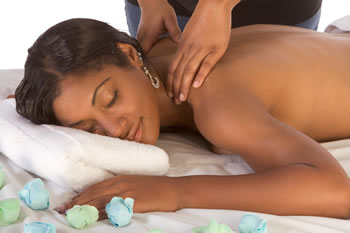Research is still in its infancy, but there is evidence that massage works for a wide variety of everyday ailments. Lisa Buckingham investigates…

Massage has been around for thousands of years, but it is only recently that researchers have begun to study its effects scientifically. Their aim? To find out exactly what it is about massage that makes us feel so good, and whether it lives up to its claims …
Anxiety and stress relief
“Massage is still woefully under-researched, but the best available evidence suggests that, among other things, it is effective for anxiety and depression,” says Edzard Ernst, professor of complementary medicine at the University of Exeter and author of Trick Or Treatment: Alternative Medicine On Trial. “It works through relaxing both the muscles and the mind, which it is thought is achieved through an increase in blood flow and levels of endorphins [feel-good hormones] in the brain.”
There is little evidence to show how long these effects last for, but it does seem massage can give you a mood boost or help you through tough times by temporarily relieving stress and anxiety.
Relieving back pain
Bad backs plague millions of us every year. A study in the Canadian Medical Association Journal compared methods of treating chronic lower back pain: it found that massage was the most effective treatment in terms of reduction in pain and anxiety, and increase in function.
“The emotional effects of massage play a huge part in the relief of chronic pain,” says physiotherapist Liz Paddock, who specialises in musculoskeletal and women’s health. “Living with pain can seriously affect people’s ability to relax – being touched is fundamental to our wellbeing and it helps sedate the nervous system. Your skin is packed with sensory receptors and touch is an important way of modifying pain signals – that’s why, if you hit your elbow on something, you instinctively rub it.”
Getting a good night’s sleep
Studies so far only relate to children, but show good results for improving sleep. Researchers at the University of Warwick compared nine studies and found that (gentle) massage by parents on children under six months could have a positive impact on sleep patterns, crying, mother-baby interaction and levels of stress hormones, which can disrupt sleep.
Soothing headaches
Rubbing your temples is an instinctive way to try to relieve a headache and it seems that body massage can also help. It decreased the occurrence of headaches, sleep disturbances and symptoms of distress, and increased serotonin (a chemical that affects mood and sleep) levels in adults with migraines in a study published in the International Journal of Neuroscience. Other studies showed similar results.
Researchers believe that two mechanisms could be responsible. Firstly, the increased serotonin could help relieve the headache (many existing headache medications increase serotonin levels). Secondly, the increased hours of sleep and fewer night wakings may lower levels of substance P – a neurotransmitter responsible for pain.
Restoring mobility
Whether you’ve damaged a muscle from a hard tackle playing football or just while painting the ceiling, sports massage has been shown to be helpful for muscle repair. For example, research shows that it increases the blood flow in the capillaries of the muscles. “Blood is nutritious for muscles and assists healing,” says Spencer McGawley, director of the Sports Massage Association. Other studies suggest that sports massage techniques can stimulate the release of biochemicals such as prostaglandins. These are essential for tissue healing. And again, the positive psychological aspect plays a part. A study in the British Journal of Sports Medicine showed that the perception of fatigue was less when a 20-minute massage was given between two intense bouts of cycling, despite no actual difference in power produced.
Lisa Buckingham
The Guardian Saturday 5 July 2008
Also see: Persuading The Body and The Importance of Posture
